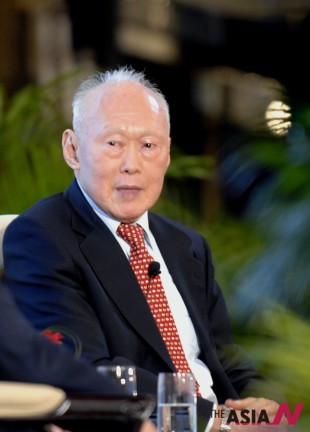
After summarizing Lee Kuan Yew’s Autobiography

“Lee Kuan Yew… whom I both love and hate.”
I do not particularly like Lee Kuan Yew. I have always been inclined to agree with the New York Times’ description of Singapore as a clean yet craven state.
Since its formation in 1965, Singapore has failed to produce any person of note worthy beyond Lee Kuan Yew. For fifty years, not a single Singaporean has become a Nobel Prize laureate, written a famous work of literature, or produced a hit movie. Also, there are no talented violinists, international idols like Kim Yuna, or prestigious religious leaders of Singaporean birth. In short, Singapore does not have anyone or anything that can make Singapore shine.
If one had to praise something, one would have to talk about how Lee Kuan Yew gave 3 to 4 million people a country of great economic prosperity. Yet one can’t really say that every one of those people is the epitome of “Homo sapiens,” who strive for the noblest values and character?
Yet I am still interested in Lee Kuan Yew, for he is the last surviving leader who has experienced the age of colonialism, and for he hoped to build Plato’s utopia: a country ruled by philosopher-kings. With regards to this goal, the Singapore that Lee gave birth to is in fact, an experimental state.
I believe that Singapore will not only last, but will also thrive. My reasoning is that Lee Kuan Yew is neither a theorist like Marx nor as naïve as Gorbachev; he was a man who not only liked Deng Xiaoping best, but was also very similar to Deng in disposition. Most important, Lee was a down-to-earth person who prioritized practical values.
Now, what kind of person is Lee Kuan Yew? In his autobiography, Lee talks about a German who very much liked him and provided him with many ideas when he was trying to build Singapore. Lee asked him, “Why do you like me so?” and the German answered, “You are extremely Confucian, yet you possess Calvinist virtues as well.” Calvinism, a branch of Protestantism that greatly influenced the Presbyterian Church, believes unlike Buddhism that faith only comes after hard work, and thus can often be strict and regulative. In this sense, Lee is a person of great rigor.
Unlike the United States of America or Japan, Singapore is not a country that has been “completed”; nonetheless, it is certainly on the path to becoming complete. Simply put, Singapore has the discipline that a proper country must have. Out of the over 200 countries that exist today, only a select few have this discipline. Lee Kuan Yew has drilled his country very well indeed. Kim Seung-woong Former Correspondent at The Hankook-ilbo | Summary by Lee Jin-kyu




One thought on “After summarizing Lee Kuan Yew’s Autobiography”
Burma has a Nobel winner. It that a great country? Even South Africa has a Nobel winner, but people have to electrify their fencing for security.